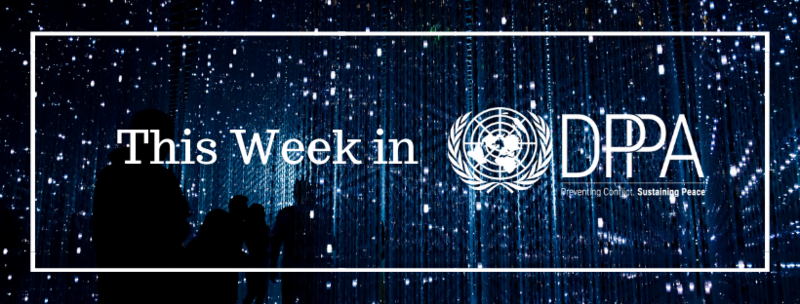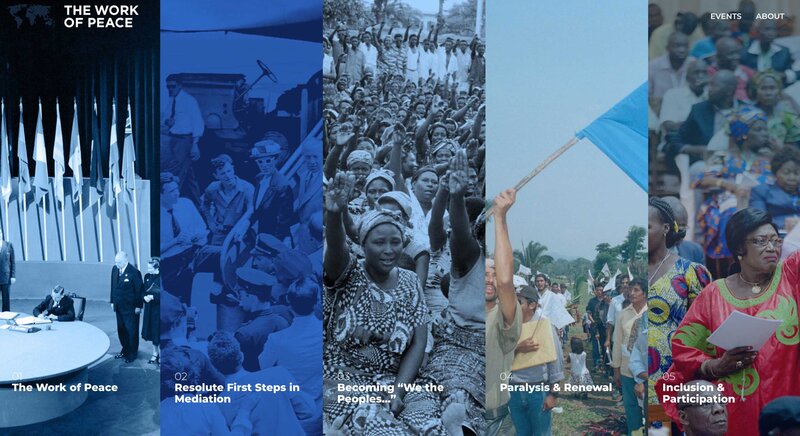Thank you so much, Mr. President,
Let me brief you today on the Constitutional Committee, the situation on the ground, and the search for a wider process towards a political solution that implements resolution 2254.
As you know, the Fourth Session of the Small Body of the Syrian Constitutional Committee convened in Geneva from 30 November to 4 December. Given the major COVID-19 challenges in Switzerland, it took the dedication of Swiss authorities, UN staff, and the Committee members themselves to hold the session safely – and I thank all for playing their part.
During the session, Committee members continued their dialogue on the agenda – which was, in line with the mandate, Terms of Reference and Core Rules of Procedure, discussing national foundations and principles. They discussed a wide range of topics and, towards the end of the week, the Government and Opposition nominee positions were also reflected in overview presentations in writing.
The delegation nominated by the Syrian Government presented eight principles related to combatting terrorism and condemning terrorist ideologies and support to terrorists, condemning unilateral coercive measures, condemning occupation of Syrian territory, rejecting separatism and separatist projects, supporting the Syrian Arab Army, promoting national identity, protecting cultural diversity, encouraging and guaranteeing refugee returns and addressing humanitarian issues. These were presented as national foundations and principles, and, as the delegation emphasized, were not explicitly linked to a future constitutional text.
The delegation nominated by the Syrian Negotiations Commission presented 23 points which addressed a range of principles including Syria’s sovereignty, territorial integrity, international relations and commitment to international law, national identity, cultural diversity, democracy, political pluralism, rule of law, separation of powers, corruption, terrorism, citizenship, refugee returns, rights and freedoms and social and economic principles. These points were framed by the delegation as grounded in the 12 living intra-Syrian essential principles affirmed in Sochi and in the Committee’s mandate – and were presented by the delegation as points for development to form part of the basic principles within a new constitution.
Some civil society members of the Middle Third presented points on conditions for safe, voluntary and dignified refugee returns, and related issues such as the restitution of housing, land and property, restorative justice and relevant independent and impartial constitutional mechanisms. Meanwhile, other members made interventions on a range of themes, such as the need to address terrorism, sanctions, sovereignty and territorial integrity.
The impact of conflict on lives of Syrian women, and the importance of their role in political life and of ensuring equality between men and women was raised on many occasions during the session – by members from all three delegations.
Mr. President,
There were many stark differences among the positions and narratives presented within the Committee. And there were a few tense moments. I was not surprised by this. But it is positive that some positions were put forward concretely. And I was somewhat encouraged that members listened to each other’s narratives with attentiveness and even respect … with fewer interruptions and points of order than before … and with some genuine attempts to engage with each other’s positions. My team and I listened carefully to all that was said, and it is possible to see, in our opinion, potential common ground in the discussions … potential that can be explored.
Consistent with the package agreed between the Co-Chairs, they and the Committee members have agreed that the Fifth Session of the Small Body will convene in Geneva between 25 and 29 January 2021 – COVID-19 conditions permitting. Without any preconditions and as agreed, the agenda will focus, in line with the mandate, Terms of Reference and Core Rules of Procedure, on constitutional principles or basic principles of the Constitution.
I will be engaging both Co-Chairs before the next session on how to ensure that the Committee moves, as its mandate says, from ‘preparing’ a constitutional reform to ‘drafting’ one. As the Co-Chairs affirmed during the session, the Committee is mandated and empowered to do this by the agreement of the Syrian Government and the Syrian Negotiations Committee.
The Constitutional Committee does, however, need to improve its working methods. I would like to see the Co-Chairs find a consensus on working methods that can promote the good functioning of the Committee and organize and structure its work, enabling it to consider specific constitutional items and draft provisions. In addition to a clear method for the Fifth session, I believe we also would need a workplan beyond that, so that the Committee works expeditiously and continuously to produce results and continued progress, without foreign interference or externally imposed timelines.
I will continue to involve and consult Syrian women, and met virtually with the Women’s Advisory Board twice during the session of the Constitutional Committee. I continue to be impressed by their commitment to supporting the political process and arriving at inclusive proposals and solutions in the interest of all Syrians, men and women. I am encouraged by their recent engagement with women’s groups in different areas of Syria and the region to test some of their ideas on the constitution and to hear of the priorities and concerns of Syrian women.
Mr. President,
This past month, I also continued to engage civil society through the Civil Society Support Room. Just yesterday, I resumed consultations with a diverse group who are experts in their respective fields. I did so using dedicated online virtual tools, allowing us to connect with a wide range of Syrian civil society actors, from different parts of Syria and the diaspora. I heard from them strong concerns at what many feel is a lack of tangible political progress, including within the Constitutional Committee. They described the suffering in many parts of Syria, the economic meltdown and the impact of sanctions and of growing criminality. They demanded progress on the detainee file and protection guarantees for refugees and their land and properties, and they called for greater civic space and protection of civil society. We will continue this dialogue -- I will meet with them again tomorrow -- and [continue] to convey the voices and messages of civil society to the parties.
These messages remind us that a credible constitutional process is important. And they also remind us that there are a range of issues beyond the constitution, of urgent concern to ordinary Syrians and identified in resolution 2254, that need to be addressed.
Violent conflict and terrorism are still very much a reality for Syrians. Thanks to existing arrangements, including those involving Russia, Turkey and the United States, a fragile calm continues, and there are ongoing efforts to address listed terrorist groups, including ISIL and Hayat Tahrir al-Sham. But this still falls well short of the nationwide ceasefire envisioned in resolution 2254. Shelling, airstrikes and IED attacks continue to kill and injure civilians. Dangers of renewed conflict are ever-present - in the northwest, the southwest and even in the northeast, where there were troubling signs of tensions this month. And much more can and should be done to address terrorist groups in a manner that is consistent with international humanitarian law and which ensures the protection of civilians.
Mr. President,
With five international armies operating in Syria, the country remains a tinderbox for a major international incident, with potential implications across the region. Much more can be done to safeguard international peace and security while also looking at practical and concrete ways to safeguard and restore Syria’s sovereignty, independence, unity and territorial integrity in the context of the 2254 process. To achieve this, key players would need to be ready to come to the table together. Mr. President,
The humanitarian situation of millions of Syrians remains precarious and even catastrophic for some. As we have just heard from [Emergency Relief Coordinator] Mark [Lowcock], and as he told you, much more must be done to ensure the necessary access and resources to meet their needs, with food insecurity a particular concern.
Indeed, Syrian civilians continue to suffer profound economic hardship, particularly with fresh currency depreciation, and shortages of bread, fuel and medicine in the middle of what is set to be a hard winter, with the COVID-19 pandemic continuing to spread. I continue to believe that more can and should be done to address these conditions, including through ensuring that any sanctions avoid aggravating the plight of Syrian civilians.
There has still been no meaningful action on detainees, abductees and missing persons, especially of late. Frankly, I am disappointed at where this file stands. It is not moving. Yet when we look at other examples in the region – take Yemen for instance – it must be possible to unblock it. There is a need for meaningful action at scale -- including access to prisons and detention facilities; the release of women, children, the sick and the elderly; and information on the missing. This is a humanitarian imperative – and also essential to build confidence and infuse the entire political process with muchneeded hope.
Mr, President,
The millions of Syrians who are refugees or internally-displaced persons are not returning to their homes at any meaningful scale. I believe that much more can be done to address the range of conditions that should be in place for refugees and IDPs to return, in a safe, voluntary and dignified manner.
Ultimately, following the adoption of a new constitution and the creation of a safe, calm and neutral environment, resolution 2254 calls for free and fair elections, administered under UN supervision, to the highest standards of transparency and accountability, and with the participation of all eligible Syrians, including the diaspora.
Mr. President,
Let’s be honest: after nearly a decade of conflict, the political process has not delivered for the Syrian people, and they continue to suffer deeply – both inside and outside Syria. Only a political solution can end this suffering, and prevent renewed conflict and instability, protecting Syria’s civilians and the region from further grave danger.
As we look back on 2020, we have two elements to build on – a relative calm with no shift in frontlines since March 2020, and a Constitutional Committee. As we look to 2021, we need a deeper and broader process: a nationwide ceasefire, substantive constitutional drafting, and a wider effort to address the full range of issues, with actions to build confidence and movement, step for step. This needs a new form of international cooperation on Syria, with key players at the table and key issues on the table.
Given the deep divides in Syria, in the region, and internationally, forging a consensus on exactly how to bring about mutual and reciprocal steps and a truly constructive Syria diplomacy is proving very difficult. But, Mr. President, I am convinced it is possible, and that there are common interests that make it so. I will be continuing – as I have started in recent weeks – to take stock, engaging the Syrian parties and key international stakeholders, and seeking to identify new and additional ways to move the process forwards. Obviously, we cannot do this alone. We need the strong and united support of this Council in charting such a path towards the implementation of resolution 2254. I count on your support.
Thank you.









